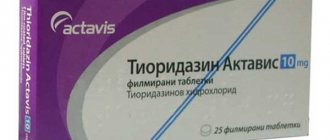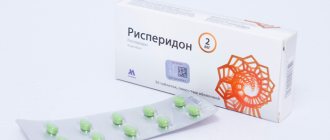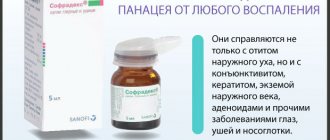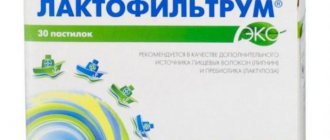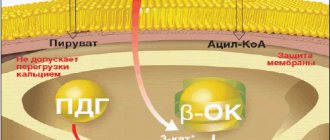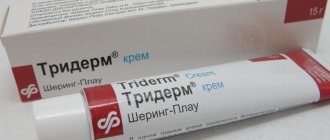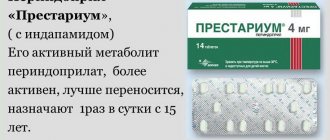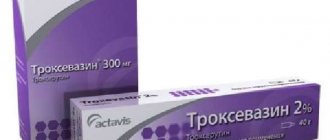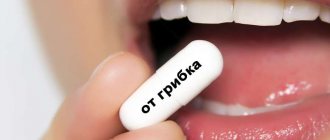Mebeverine is used in the drug therapy of irritable bowel syndrome and other pathological conditions accompanied by spasm of the smooth muscles of the digestive tract. This is an antispasmodic drug that reduces the tone of muscle fibers. The use of the product relieves pain and discomfort. Prescribed only to adult patients after a medical examination.
The stomach, intestines and other parts of the gastrointestinal tract have smooth muscle fibers as part of their wall. Contractions of these fibers form the motility necessary for the movement of food substrates and the formation of feces. An excessive increase in muscle tone leads to spasms, accompanied by pain and other unpleasant symptoms.
Pharmacodynamics and pharmacokinetics
Mebeverine blocks sodium channels in the semipermeable membrane of myocytes , thus disrupting the flow of sodium ions into the cell, calcium ions also do not penetrate the membrane, and muscle fibers stop contracting.
The substance relaxes the smooth muscles of the gastrointestinal tract, relieves spasms, but does not reduce normal intestinal motility. The drug does not have a central anticholinergic effect .
Immediately after entering the gastrointestinal tract the substance undergoes presystemic hydrolysis , producing veratric acid and mebeverine alcohol.
Mebeverine Hydrochloride cannot be detected in blood plasma. Metabolites are excreted in urine and bile within 24 hours. The product does not accumulate in the body.
Preparations containing this active substance do not have a teratogenic effect .
Absorption and excretion
The active components from the capsule are gradually released in the intestines and act only in the organ cavity. The drug undergoes hydrolysis. Chemical compounds do not cross the mucosal barrier and do not enter the bloodstream. There are no systemic effects. The active substance is converted in the liver tissue to form metabolites. It is removed from the body mainly by urine and partly by bile. Complete excretion from the body occurs within twenty-four hours.
Indications for use
Mebeverine is prescribed to adults:
- to relieve spasms in the gastrointestinal tract resulting from organic diseases;
- for biliary and intestinal colic ;
- as a symptomatic treatment of cramps and pain, discomfort and intestinal disorders ( irritable bowel syndrome ).
The drug can also be prescribed to children over 12 years of age for functional disorders of the gastrointestinal tract, which are accompanied by spasms and pain.
Instructions
The instructions contain information about indications, side effects, contraindications, method of administration, release form, drug interactions, composition, conditions of use during pregnancy/breastfeeding, storage conditions, required dosage, and expiration date. All this data must be carefully studied in order to avoid unforeseen consequences in the future. To fully familiarize yourself with the medicine, you can also find information about reviews, analogues and price range in the article.
pharmachologic effect
Mebeverine has myotropic and antispasmodic effects. The drug provides: blocking fast sodium channels of the myocyte cell membrane, disrupting the entry of sodium ions into the cell, blocking the entry of calcium ions through slow channels, slowing down the processes of membrane depolarization, preventing muscle fiber contraction.
Promotes relaxation of smooth muscle structures, mainly the gastrointestinal tract. Relieves spasm. It does not have a significant effect on normal intestinal motility. Does not have anticholinergic effect.
It is not detected in plasma after oral administration because it undergoes presystemic hydrolysis in the liver to form mebeverine alcohol and veratric acid.
It is excreted in the form of metabolites (veratric acid, mebeverine alcohol) mainly during urination, and is determined in bile in small quantities. Complete elimination of the drug occurs within a day after taking a single dose.
Indications
This remedy is used to treat many diseases of the gastrointestinal tract.
Such diseases include conditions such as:
- Biliary and intestinal colic;
- Spasms in the gastrointestinal tract that occur as a result of any disease;
- Cramps, pain, intestinal disorders (irritable bowel syndrome).
The drug can also be prescribed to children whose age has exceeded 12 years, in case of disturbances in the functioning of the gastrointestinal tract, which may be accompanied by pain and spasms.
Method of administration
Capsules must be taken orally, but under no circumstances should they be split, chewed or crushed. It should be swallowed whole. The capsule should be taken 20 minutes before the start of a meal.
Important! Only a specialist can select the required dosage, as well as the duration of therapy.
There are different treatment regimens, however, the average dosage is no more than 400 mg.
Adults are prescribed:
- 100 mg each. The number of doses per day is no more than four times;
- 200 mg each. The number of doses per day is two times;
- 135 mg of Mebeverine. The number of doses per day is three times.
As a rule, after achieving the desired effect, the dosage is gradually reduced.
No studies have been conducted on dosage in elderly patients or those with liver/kidney problems. However, doctors still do not rule out the possibility of dosage adjustment, so you should visit a doctor before starting treatment.
Release form
This drug is available in the form of capsules that have white or almost white pellets.
The medicine contains mebeverine hydrochloride, as well as hypromellose, magnesium stearate, povidone K-30, macrogoll 6000, ethylcellulose. The capsule contains gelatin and titanium dioxide.
Drug interactions
Important! Before prescribing the drug, you should inform your doctor about taking any medications!
Despite the fact that the drug with ethanol did not cause any negative effects, doctors still do not advise drinking alcohol, because it slows down the healing process.
Instructions for use of Mebeverine (Method and dosage)
The tablets are taken orally, without splitting or chewing, some time before meals (20 minutes).
The dosage and duration of treatment is determined by the attending physician.
Instructions for use of Mebeverine
There are different treatment regimens with the drug. The average daily dosage is 400 mg.
Adults are prescribed:
- 200 mg, 2 times a day, before meals;
- 100 mg, 4 times a day;
- 3 times a day, 135 mg of the drug.
Usually, after achieving the desired effect from taking the medicine, the dosage is gradually reduced.
Side effects
The effect of the drug is well tolerated. Adverse reactions are rarely detected.
Possible side effects:
- Immunity: increased immune sensitivity to the components of the capsule, manifested by allergic reactions. Affects primarily the skin. There may be anaphylactic manifestations.
- Digestive system: urge to vomit, stool retention, loose stools.
- Skin and soft tissues: Quincke's edema, redness, skin rashes, itching, exanthema and other manifestations of skin allergies.
- Others: cephalalgia, dizziness.
If signs of allergies or complications not described in the material occur, you should stop therapy and consult your doctor.
Preparations containing (Mebeverine analogues)
Level 4 ATC code matches: Aprofen
Meverin
Niaspam
Trimedat
Duspatalin
There are a number of drugs - analogues of Mebeverine (synonyms containing the same active substance): Duspatalin, Niaspam, Mebeverine Hydrochloride, Sparex .
Side effects
Side effects as a result of taking are rare. In isolated cases, the patient may experience such manifestations as:
- Dizziness, nausea, vomiting, loss of orientation in space;
- Head pain, exanthema;
- Swelling, urticaria, angioedema, itching, redness of the skin.
If these manifestations occur, the medication must be stopped. As a rule, the condition normalizes on its own within a few days, however, if this does not happen, you should call an ambulance or go to the hospital yourself.
Theoretically, in the event of an overdose, disorders are possible that are neurological or cardiovascular in nature. Symptomatic therapy should be used as treatment.
Overdose
Taking Mebeverine in large quantities promotes stimulation of the central nervous system. To eliminate the consequences of an overdose, components of the drug that have not had time to be absorbed are removed from the gastrointestinal tract. To do this, the stomach is washed, after which activated charcoal is prescribed.
Contraindications
This drug is contraindicated in conditions such as:
- Allergy to certain components of the drug;
- The patient's childhood age is up to 18 years;
- Intestinal obstruction of a paralytic nature.
Pregnancy
You should refrain from taking this or any other drug during pregnancy.
This measure is aimed at ensuring that there is no negative impact on the developing body of the fetus. If it is impossible to refuse taking the drug, then the use of the medication is allowed, but the girl must be regularly monitored by a doctor.
Reviews about Mebeverine
Reviews about the drug are mostly good. The product quickly, within 20-30 minutes, eliminates pain and relieves spasms, rarely causing adverse reactions. Medicines containing Mebeverine are often prescribed for pancreatitis and cholecystitis . Most often, improvements in the condition of the gastrointestinal tract occur within 2-3 days, some people stop taking the pills after that.
It is also worth noting that the drug should be taken strictly as prescribed by the doctor and according to direct indications. The drug is unable to cope with the pain associated with gastritis or stomach ulcers .
Analogues of the product
There are other medications based on this chemical compound. You need to look at the dosage, dosage form and other features.
Popular analogues:
- Dutan.
- Duspatalin.
- Sparex.
Analogue
The choice of analogue is made together with the attending physician.
Mebeverine or Drotaverine – which is better?
Manufacturer: TEVA, Bulgaria
Release form: tablets
Active ingredient: drotaverine
Drotaverine is an inexpensive substitute for Mebeverine, which is an antispasmodic.
It is worth noting that these drugs have different pharmacological effects. Drotaverine begins to act much later, which indicates lower bioavailability. It also has a large list of contraindications and adverse reactions from the body. During therapy, the patient’s general condition, age and existing limitations are taken into account.
Mebeverine or Trimedat – which is better?
Manufacturer: VALENTA+, Russia
Release form: tablets
Active ingredient: trimebutine
Trimedat is an antispasmodic, prokinetic agent, which contains trimebutine. It is an analogue of Mebeverine in tablets. A distinctive feature of the drug is its high efficiency. Disadvantage: overpriced. The product does not have a negative effect on the condition and functioning of the stomach and intestines. The analogue of Mebeverine Trimedat helps to cope with spasms, pain, sensations, colic, diarrhea, constipation.
Prescribed for adults and children from three years of age. There is a minimal list of side effects, so it is considered completely safe.
Release form
Mebeverine is available in the form of gelatin capsules, they are hard and white in color. The main component is Mebeverine hydrochloride, its content in capsules does not exceed 200 mg per piece.
It contains additional substances:
- Povidone.
- Sucrose.
- Hypromellose.
- Magnesium stearate.
- Macrogol.
- Ethylcellulose.
The capsule contains chemical compounds of titanium dioxide and gelatin. The total mass of the capsule has a volume of 250 mg.
Mebeverine for oral use is available in cardboard boxes containing three coins, 10 pills each. One capsule contains 200 mg of Mebeverine hydrochloride. The package contains detailed instructions on the correct use and purpose of this drug.
Analogs
If for some reason (high price, individual intolerance, contraindications) the use of Mebeverine is impossible, the prescription of its substitutes is allowed.
This can only be done by a doctor, since self-medication will aggravate the course of the disease and lead to side effects.
The following analogues are used:
- Mebespalin retard. Produced in Russia pharmaceutical. The average price ranges from 300 to 360 rubles . The main active ingredient is Mebeverine hydrochloride. In one tablet form its content does not exceed 200 mg. The main indications for use are spastic pain, removal of dysfunction, symptoms of discomfort in diseases of the digestive system and large intestine. A good effect is observed in the treatment of chronic pancreatitis. Contraindicated in patients prone to allergic reactions to the ingredients of this medicine; not for children and pregnant women. During the treatment period, breastfeeding is interrupted.
- Niaspam. Country of origin: India. Available in capsules (200 mg). Depending on the region, the average price ranges from 380 rubles. up to 440 for 30 pieces. Prescribed for organic lesions accompanied by spastic pain in the esophagus, stomach, and large intestine. Gives a positive effect when spasms of the biliary tract occur. Can be used in adolescence from 12 years of age. Used in the treatment of pregnant women. It has a small number of contraindications, the main of which is increased hypersensitivity to the components of this drug.
- Sparex. Produced in Russia. Capsules of 200 mg, the main active ingredient Mebeverine, are produced in 30 pills in a cardboard package. Average price 300 rub. It relieves stomach and intestinal colic well, relieves irritability in the large intestine. Children over 12 years of age can be used for pain in the abdominal area that is associated with poor eating habits. It is not used during breastfeeding; it is prescribed to pregnant women with caution. Side effects may occur in the form of dyspeptic stool disorders (diarrhea). In severe cases, Quincke's edema may develop.
- Duspatalin. Produced in France pharmaceutical average price is 800 rubles. Available in 30 capsules in cardboard packaging. It has a pronounced antispasmodic effect for all types of colic. It is used in the treatment of cholelithiasis, to improve the flow of bile. It has a good effect in the treatment of chronic pancreatitis. Can be used in children from 12 years of age. Can be used when carrying a child at all stages of pregnancy. The main contraindications are the period of breastfeeding and individual intolerance.
- Dutan. CJSC Pharmaceutical, Russian production. Depending on the region, the price ranges from 310 to 610 rubles. The main indications are the presence of spasmodic pain in the stomach or large intestine. The main contraindications are pregnancy and individual intolerance.
- Trimedat. Produced by the pharmaceutical company Valenta. The average cost ranges from 235 rubles. up to 410 rub. Produced in foreign currencies, 10, 20, 30 pills per package. It is prescribed for patients with various types of dyspeptic disorders (nausea, vomiting, diarrhea), and for diseases of the esophagus (esophagitis and esophagospasm). Does not apply if the patient has hearing impairment, severe hypotension, or a disturbance in the psycho-emotional state, which is accompanied by feelings of anxiety and restlessness. During pregnancy, it is not prescribed in the first trimester. Due to its good tolerability, this drug can be used in early childhood, starting from 3 years of age.
- No-shpa. The country of origin is Hungary, pharmaceutical pills of 40 milligrams No. 24 are produced at a price of 100 rubles. The main active ingredient is Drotaverine hydrochloride. This broad-spectrum antispasmodic is used to relieve headache attacks and to eliminate intestinal and stomach colic. In labor practice, it promotes the dilation of the cervix, and is also used to prevent premature birth and miscarriages. When using it, there are generally no side effects; sometimes dyspeptic disorders appear in the form of nausea or vomiting, and impaired bowel movements. Blood pressure rarely drops. Children can be prescribed from one year of age. Used in all trimesters of pregnancy, but under strict medical supervision.
- Drotaverine. Cheap synonym, country of origin: Ukraine, produced in pharmacological tablets of 40 mg No. 20, average price 30 rubles. It has a pronounced analgesic and antispasmodic effect. Used to relieve acute attacks of hypertension, painful menstrual cycles, stomach and intestinal pain of various etiologies. Use in early childhood is allowed; from 1 year of age it is used in the form of injections, and upon reaching 3 years of age tablet forms are used. Pregnant women can take it in all trimesters, but it is not recommended to abuse this drug. The big plus is that it has few side effects. Rarely, dizziness and insomnia may occur, blood pressure may drop, and a skin rash may appear.
- Mebeverine hydrochloride. Produced in Italy, Belgium and Spain, produced in plastic bags, in powder form for internal use. It is a complete analogue of Mebeverine and has the same indications and contraindications. When used, mebeverine has few side effects and contraindications and is well tolerated by patients in different age categories. These qualities can be noted as advantages of this drug. But it also has negative sides. The biggest disadvantage is its price; it does not make it generally available, and does not make it possible to use it for a long time (although this is allowed in the instructions for use). Despite the fact that this drug has been used for 40 years, it belongs to the category of little-studied pharmacological agents. There is no data on the effect on children, youth and teenagers. The mechanism of action has not been studied during breastfeeding. Because of this, its effect on the baby’s body if he is breastfed is still unknown. Another negative point is that it is difficult and sometimes impossible to purchase it in a regular pharmacy.
Drotaverine Mebespalin retard
Mebeverine hydrochloride
Nispam
No-shpa
Duspatalin
Trimedat
Sparex
Mebeverine or No-shpa - which is better?
Manufacturer: SANOFI, Hungary
Release form: tablets, injection solution
Active ingredient: drotaverine
No-spa is an analogue of Mebeverine 200 mg, which is also an antispasmodic.
It is worth noting that the drug has a less pronounced therapeutic effect. Therefore, it will not be possible to achieve better results in the treatment of spasms in the digestive tract in a short time. The bioavailability of the products is similar.
Price
Important! Price information must be obtained from the pharmacy.
The cost of a medicine is based on the markup on the drug, the purchase price, and the costs incurred by the company when transporting the goods. It is worth understanding that in different countries the currency will be different, and accordingly the price will change significantly. Price jumps can be considered using the example of two neighboring countries - Russia and Ukraine.
Russia
On average, you will have to pay 440 rubles for this medicine.
Ukraine
On average, you will have to pay 226 hryvnia for the drug Mebeverine.
special instructions
Before using the medicine, it is important to read the special instructions for its use.
Impact on the ability to drive vehicles and operate machinery
While undergoing a course of therapy, it is not recommended to perform potentially dangerous work or drive vehicles, since the occurrence of undesirable reactions – headaches, dizziness – is possible.
Pregnancy and lactation
Treatment with Mebeverine during pregnancy should be avoided. The only situation in which the use of drugs is possible is when it is impossible to avoid therapy with Mebeverine, and the doctor gives permission for this type of treatment.
When treated with therapeutic doses of Mebeverine, the active substance is not excreted in breast milk. Therefore, the medicine can be safely used during lactation.
Use in pediatrics
Mebeverine is prescribed to children, but only after reaching 12 years of age.
For impaired renal and liver function
People with problems with the liver and kidneys do not need dose adjustment.
Use with alcohol
The drug can be combined with alcoholic drinks.
Conditions for dispensing from pharmacies
The product is sold upon presentation of a doctor's prescription.
Use during pregnancy and lactation
Like any other medication, taking Mebeverine is not advisable. This is especially true in the first trimester of pregnancy, when the formation and formation of the internal organs of the future newborn occurs.
If this medication is still prescribed, the expectant mother should be under constant medical supervision. The dosage should be individual, sometimes its volume is reduced.
After childbirth, when a woman is breastfeeding, the drug used can pass into breast milk, and with it into the baby’s body. This is extremely undesirable, since the effect of this medicinal substance on the child’s body has not yet been fully studied.
Therefore, the parallel use of Mebeverine and breastfeeding is excluded, or during its use there is a break in breastfeeding. The best way out in this situation is to find a medicine whose use is allowed during breastfeeding.
Contraindications
Mebeverine is well tolerated by patients, but in some cases there are restrictions on the use of this medicine.
It cannot be used in the following cases:
- Increased individual intolerance that occurs when using Mebeverine.
- Lack of sucrose in the patient's blood.
- Hypersensitivity to fructose.
- Children and teenagers, if they are under 18 years of age.
This drug is not recommended (or should be used with extreme caution):
- In all trimesters of pregnancy.
- When breastfeeding occurs.
- Fertility.
Reviews
The overwhelming majority of reviews about the drug are positive. This is further confirmation that the drug is highly effective.
Among the positive aspects, people note such points as low cost, convenient form of release, as well as a minimal set of contraindications.
Among the negative aspects, one can highlight the presence of side effects. In addition, among the negative aspects, patients also highlight the fact that the drug is quite difficult to get at a pharmacy.
Storage conditions and dispensing in pharmacies
To store Mebeverine, it is best to use cool, dark places that are out of reach of children. Its shelf life does not exceed 2 years from the date of release. If it has not been used and the storage period has expired, it must be destroyed.
When purchasing from a pharmacy chain, to purchase it you must present a prescription with the doctor’s personal signature and his personal seal.
You can purchase this medicine at a lower price in the online store. But due to the increased number of counterfeit drugs, it is best to purchase any dosage forms from a pharmacy chain.
Here you can request a certificate indicating the quality and authenticity of this medicine.

